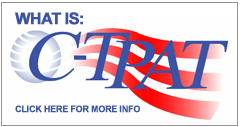by Barry Brandman
During a recent trip to mainland China, I inspected the security at a large manufacturing complex on behalf of a client. Prior to my arrival, I had been advised by one of their U.S. based Vice Presidents that he was confident I would not find anything lacking because they had just undergone “an official” supply chain security audit by a local compliance company who gave them an outstanding evaluation.
After conducting my assessment of this facility, I advised their on site management team that their security policies, procedures and technology were not even close to being C-TPAT compliant. I explained for example, that their personnel were not conducting proper container inspections prior to loading exports destined for the States, and that their finished goods department (which consisted of a building without doors), had product staged for hours at a time with no monitoring of any kind. They also were not bothering to place security seals on their loaded export containers until they reached the Hong Kong border (a two hour trip from their site). Consequently, their U.S. bound shipments, as well as the containers they used, had no real chain of custody.
They asked me to read the report they had received from this compliance company and give them my thoughts. I pointed out an array of observations and conclusions in the report that were factually inaccurate. They agreed that the report had limited value and admitted that the people who conducted the audit didn’t appear to know much about supply chain security. The weaknesses I had uncovered they said, were not examined or discussed during that audit. Yet, they were advised that they were successfully meeting C-TPAT criteria and awarded with an excellent numerical rating.
Is this an uncommon occurrence? Unfortunately, it’s not. After the C-TPAT program came into existence, it didn’t take long for a number of companies with little or no core competency in asset protection to magically transform themselves into supply chain security experts overnight. Despite the fact that they possessed scant knowledge of security technology and many had never conducted investigations into inventory theft, cargo crime, sabotage, fraud, smuggling or workplace substance abuse, these “experts” began aggressively advertising to overseas companies, promising them C-TPAT complaint security programs.
Some have even taken it a step further. During an audit at a Hong Kong consolidator, the general manager took me into his private office and proudly displayed their C-TPAT membership certificate hanging on the wall. When I asked if his company had any presence in the United States he replied no. Upon closer examination of his certificate, it was apparent that the certificate had not been produced by U.S. Customs and Border Protection.
I then proceeded to review their physical and procedural security safeguards and found them deficient in a number of areas. I explained that his loss prevention program required a good deal of improvement, and began discussing needed remedial action. He replied that if his security was inadequate, why was it that he was granted C-TPAT certification? At that point, I broke the bad news that his certificate was not legitimate and that his business entity wasn’t even eligible for C-TPAT membership. He was clearly shaken and replied, “But I paid over $6000 U.S. to this firm to become a member!”
Motivated by the opportunity to turn a quick dollar, a number of firms continue to prey on uninformed companies who have a sincere desire to either join the C-TPAT program or become C-TPAT compliant.
This problem transcends how I personally regard the ethics of these firms guilty of misrepresentation. Far more important are the significant risks that are created by companies that are performing superficial audits and providing bogus certifications.
Experts agree that the most vulnerable links in the supply chain are usually found on foreign soil. These are the likely places where terrorists will attempt to smuggle a chemical, biological or nuclear weapon inside a carton, pallet, container or trailer, which will then be sent to the United States. This is why Customs and Border Protection sends out C-TPAT Supply Chain Security Specialists who perform foreign validations every three years.
While these formal validations serve an important purpose, they typically only provide CBP with a very limited glimpse of an importer’s supply chain. The C-TPAT representatives may only have the opportunity to evaluate less than 10% of an importers entire network.
As previously stated, these validations only take place once every three years, a time frame where a company’s security program can easily develop gaping holes.
Plus, the C-TPAT validation team will always provide advance notice when they will be arriving and what facilities they intend to inspect. Consequently, when they are on site they may not be seeing a true representation of how the protective safeguards really operate on a day to day basis.
This is why CBP mandates that C-TPAT certified companies must conduct comprehensive self assessments of their supply chain security. These audits should identify weaknesses, recommend solutions to strengthen those areas that are vulnerable, as well as provide awareness training for key personnel. These audits should also result in detailed action plans, complete with time tables for completion of the needed remedial work.
However, when these audits consist of little more than individuals with questionable experience and expertise merely “pencil-whipping” generic checklists, this process becomes little more than a meaningless exercise.
Despite having significant vulnerabilities in their asset protection controls, after receiving these superficial audit reports and bogus certifications, foreign companies oftentimes then operate under the assumption that their supply chains are extremely secure. This false sense of security can be compared to wearing a defective bullet proof vest that won’t stop a 38 caliber round. While you may feel well protected, when actually tested the consequences could prove catastrophic.
U.S. importers cannot afford to rely on cosmetic, ineffective security programs. The first time their supply chain is victimized may not only lead to the suspension or revocation of C-TPAT membership, but could also result in significant financial loss, irreparable harm to their reputation, and most concerning, the opportunity for another major act of terrorism inside the United States. As we reflect on 9/11, let us remain committed to never allowing history to repeat itself.



